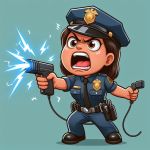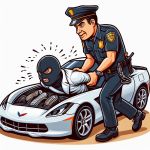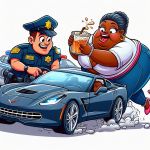Standardized Field Sobriety Tests
![]() Further Info: I am not a law official, lawyer, or anybody of consequence. This article is reported out of anecdotal evidence and is also satirical in nature. No actual legal counsel is expressed or implied. On top of that, it's kinda ridiculous that you have to say all that shit in this day and age because people get butthurt for no reason when you don't. 🤔
Further Info: I am not a law official, lawyer, or anybody of consequence. This article is reported out of anecdotal evidence and is also satirical in nature. No actual legal counsel is expressed or implied. On top of that, it's kinda ridiculous that you have to say all that shit in this day and age because people get butthurt for no reason when you don't. 🤔
Standardized Field Sobriety Tests are a dog and pony show that police officers run a suspect through during a DUI traffic stop. This article will explain the most popularly used tests and explain why they are used. It will also explain why you should never do these tests under any circumstances.
It must be stressed that the easiest and best way to avoid Standardized Field Sobriety Tests is to not drive drunk. But you already knew that and saying things that way comes off as smarmy and holier than thou.
Even still, further information on this subject can be found under the article: What To Do When You Are Drunk And Get Pulled Over By A Police Officer.
Order Of Operations
Just like mathematics, police officers follow an order of operations.[1] It goes something like this:
- They Ask. This action usually comes first when you interact with an officer. It may come off as casual conversation. It is not. Police officers are continually gathering evidence, and you should be aware of this. An example of an "Ask" would be something like "do you know how fast you were going?" or "how much have you had to drink tonight?"
- They Tell. This action is a lawful order[2] that you must obey. If you don't obey, you may be subject to a beatdown, a tazing, or even a gunshot wound. Examples of lawful orders are "GET ON THE GROUND, FUCKO!" and "Please step out of the car."
- They Make. This is when they wrestle you to the ground because you didn't do what they told you to do. Wrestling with a police officer can (and usually will) involve "pain compliance." This can involve wrist locks, the "elbow to the sky" maneuver, taser deployment, and other pain inducing actions that will the officer to control the suspect.
It must be noted that this order of operations is fluid and can happen in several ways, or not at all. If a police officer walks up on a suspect raping a woman with a knife to her throat, he will probably skip the first two steps. The situation will dictate the way things happen.
A Quick Scenario
The following dialog is meant as a ficticious scenario to explain how "Ask, Tell, Make" works and how it could fit into a Standardized Field Sobriety Test situation.
- You are driving
- Officer witnesses you doing something wrong
- Officer pulls you over
- Officer Asks you conversational questions
- Officer decides that you are intoxicated
- Officer Tells you to step out of the car
- You step out of the car
- Officer Asks you to perform field sobriety tests
- You tell him no and that all cops are pigs
- Officer Tells you that you are under arrest
- You attempt to get back in your car and run the officer over
- Officer jumps out of the way, reaches into your car and shuts it off, yanks you out, beats the hell out of you, and Makes you get cuffed and stuffed
The Tests
So, after ignoring most of this article, you have decided to do the field sobriety tests because a police officer has Asked you to do them. They may have even told you that "if you do not do these tests, your license will be taken away." This is true. All states require a one year suspension for drivers that refuse field sobriety tests. What the police officer doesn't tell you is that once you go before the magistrate or judge, you can have your lawyer (you do have a lawyer, don't you?) ask for driving privileges. 99% of the time, these privileges are granted owing to the fact that just about everybody needs a car to get to their job. If you have a standard, no wreck, no damage, no vehicular homicide DUI, you will most likely get driving privileges.
But anyways, you have agreed to take the tests because you are drunk and think you can fool a trained "drunk detecting professional."
Before The Tests
Before performing field sobriety tests during a traffic stop, the police officer should ask you about any medical conditions, disabilities, or injuries, as these can affect the accuracy of the tests. The officer will also consider your age, current medications, or other conditions. Don't try to lie your way out of this, they will find out and you will catch another charge. After all, you decided to do these tests, why screw them up now?
Nystagmus Test
Sometimes called Horizontal gaze nystagmus (HGN). This is one you can't practice for. If you have been drinking and the officer whips out his pen, you will fail this test.
![]() HGN refers to the bouncing or involuntary jerking of the eye. Police officers want to observe horizontal gaze nystagmus, a completely involuntary motion that becomes more pronounced when impaired by alcohol and some illicit and prescription drugs, primarily depressants.[3]
HGN refers to the bouncing or involuntary jerking of the eye. Police officers want to observe horizontal gaze nystagmus, a completely involuntary motion that becomes more pronounced when impaired by alcohol and some illicit and prescription drugs, primarily depressants.[3] ![]()
Walk And Turn
Also known as "WAT," this test is pretty self explanatory. You walk and you turn. But it isn't so simple. There are a whole bunch of rules you have to follow while walking and turning. These rules are there to divide your attention. A drunk can't do six things at once, so if you do this test after a few cocktails, you will fail it.
This is the procedure of a WAT: The police officer will direct you to take nine steps, heel-to-toe, along a straight line. Then, you turn on one foot and return in the same manner in the opposite direction.
One-Leg Stand
Also called "OLS." The officer asks you to stand with one foot about 6 inches off the ground and count for 30 seconds. You can bet your ass that right now, in some campus frat house, there are a bunch of drunk college kids practicing this one, seeing who can last the longest after doing 3 keg stands and half a bottle of Jagermiester.
Swaying while balancing, using arms to balance, hopping, or putting the foot down indicates possible impairment.
Accuracy
The accuracy of these tests have been argued back and forth for decades. While the experts claim that they are fair and accurate, there are a whole slew of people who cannot pass these tests sober. No matter which side your opinion lies, there is a lawyer out there with decades of trial experience that will shoot down your opinion. I said at the begining that this is a dog and pony show, and it is. Even still, I will include some "official" sounding numbers for the sake of the article:
Tests sponsored by the National Highway Traffic Safety Administration[4] revealed that the HGN test is most reliable (77 percent), followed by the walk-and-turn test (68 percent) and the one-leg-stand test (65 percent).
Non Standard Tests
These are tests you may remember from old television shows or ones you joked about at the last party you went to. They may still be used from time to time, but they are considered non standard because they are not as reliable as the standard tests. Even still, you may find an officer out there asking you to say the alphabet without singing it.
- Standing with feet together and tipping the head backward
- Counting the number of fingers an officer raises
- Reciting the alphabet <---you aren't allowed to sing it.
- Reciting the alphabet backwards (most cops don't do this one anymore because they themselves cannot do it sober)
- Counting backward - they usualy pick some random number like 81 or 47 and ask you to count down from that
- Standing and leaning back to look up at the sky while holding arms to the side - this can also involve touching your nose
- Closing your eyes and touching your nose with a finger
References
- ↑ https://www.police1.com/police-training/articles/the-ask-tell-make-mistake-fz633oUFKu8G82nO/
- ↑ Lawful order means any order, directive, policy or instruction given by an authoritative source or given to ensure compliance with federal, state or local law which may be conveyed verbally or in writing. https://www.lawinsider.com/dictionary/lawful-order
- ↑ https://www.findlaw.com/dui/arrests/what-is-horizontal-gaze-nystagmus-hgn.html
- ↑ https://www.ojp.gov/ncjrs/virtual-library/abstracts/standardized-field-sobriety-testing
What To Do When You Are Drunk And Get Pulled Over By A Police Officer | Cohen v. California (1971) | Terminiello v. Chicago | Stealing Water | Horrible Terrible Ugly Sexual Harassment | Butchering the Human Carcass for Human Consumption | At A Loss... | Not my problem. | People Who Threaten Your Freedom | Gary The Tow Truck Driver | Augsburg Book of Miracles | EGF & Foreskin Cosmetics | Hoes Mad | Martian's Girlfriend | Robert "Bobby" Crimo's Arrest | Hate Memes | The Worst Thing Ever | Sex Offender | Feminism | GROUNZ | What To Do With An Old Mobile Home | Rub n' Tug | White Privilege | Hookers | Zoomers | Coat Hanger | Trump | Tucker | Panpsychism | Giovanni Quintella Bezerra | Rythmic Slapping Sounds | The Dictionary Of Obscure Sorrows | 10,000 Most Common Passwords | The Break In | Greer v. Moon | Standardized Field Sobriety Tests | Gender Pay Gap | The Law of Merited Impossibility | The Celebration Parallax | The Law of Salutary Contradiction | The Smails Exhortation | The Lie-Back Imperative | The Enmity Counteraccusation | Now It's Your Problem | Not My Problem | Two Weeks Notice | This Is Extremely Dangerous To Our Democracy | Credit Score | Fred's Funeral






